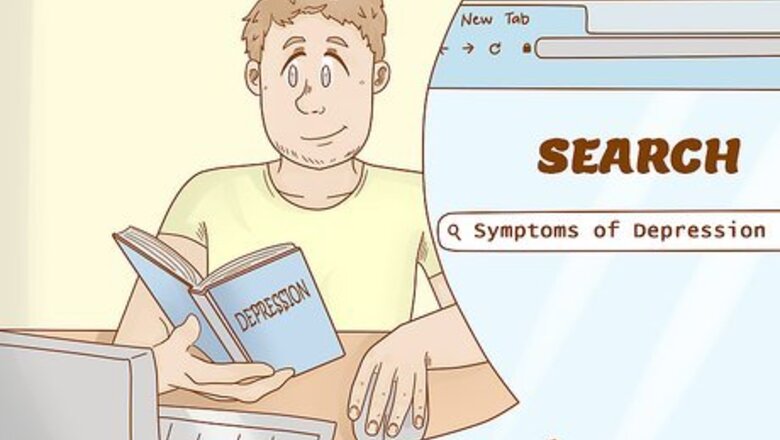
views
Being Supportive
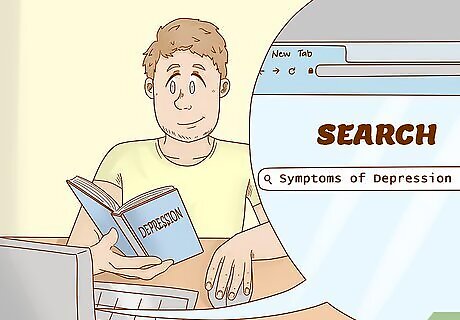
Learn about the symptoms of depression so you can recognize them. If you've never dealt with it yourself, it can be hard to understand what depression is like. By learning what someone with depression is actually experiencing, you'll be able to better understand what your loved one is going through. This can help you maintain perspective while you're dealing with them. Some common symptoms of depression include: Feelings of sadness or hopelessness, as well as sudden anger and irritability Fatigue and difficulty concentrating Loss of interest in things they normally enjoy Trouble sleeping or sleeping too much Neglected hygiene or appearance Changes in appetite, which may lead to weight gain or weight loss
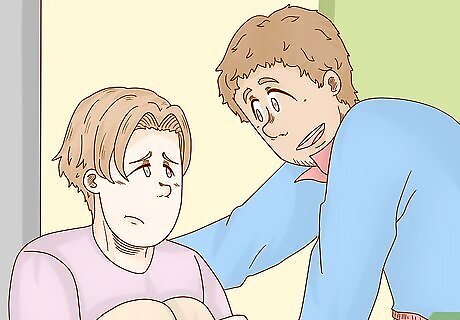
Express your concerns in a loving, supportive way. You don't have to pretend that your loved one is doing just fine, especially if they clearly aren't. Let them know that you see that they're going through a difficult time and that you're there for them. For example, you might say, "I've noticed you've seemed pretty down lately. I just wanted to let you know that you're not alone." You could also ask questions like, "Did anything happen that made you feel this way?" or "Do you want to talk about how you're feeling?" Avoid putting any judgments on the person's depression. For instance, don't say, "It's obvious you're depressed, and it's really selfish how you're causing your parents so much stress." Instead, you could say, "Your family and friends really love you, and we'll be here for you no matter what."

Treat the person how you would if they had any other illness. Think about how you might soothe and comfort your loved one if they had the flu. Then, treat them with the same amount of love, care, and compassion that you would while they were recovering from that. For instance, you might prepare meals for them and help them with chores around their home. You can also reassure them that they'll feel better soon, and you might even encourage them to talk to their doctor.

Ask the person how they would like you to support them. Sometimes the best thing you can do is just to let your loved one know you're there. Ask them to tell you what specifically you can do for them. Then, do your best to help them in whatever way is most meaningful to them. Try saying something like, "I'd really like to help you however I can. What's one thing you really wish someone would do for you right now?" It's okay if your loved one isn't able to come up with something right away. Let them know that the offer stands, and remind them that you're there to help each time you talk to them. If they say they'd like to be left alone, ask them if it's okay if you just sit with them quietly.

Invite your loved one to do things with you. While depression might make your loved one want to hide in their room for weeks at a time, it's still important that you stay in touch with them and regularly invite them to join you for fun, uplifting activities. For instance, you might ask them to go with you to eat dinner at their favorite restaurant, see a concert, or even just go for a walk. Depression often causes people to isolate themselves from their friends and loved ones. Even while they're pushing you away, they might be struggling with feeling really alone, so inviting them to spend time with you can help them remember that they're loved. Avoid saying anything like, "You just need to get out of the house to feel better." Instead, say something like, "I really miss spending time with you. Can we get a cup of coffee together this afternoon?" Don't be surprised if they say no or cancel at the last minute. However, try not to get discouraged—just keep inviting them to things until they say yes.

Remind the person what you love about them when you talk. When someone has depression, it's hard for them to feel good about themselves. In turn, this makes it hard for them to feel like others really love them. To help counteract this, take every chance you get to tell your loved one how much they mean to you, and be specific about which of their qualities and characteristics you love the most. For instance, you might say something like, "You are so special to me. Nobody gets my sense of humor like you do, and I don't know what I'd do if I didn't have you around." If they ask you how you're doing, you could say something like, "I really love that you're so compassionate, even when you're not feeling well yourself." If they start engaging in negative self-talk, try saying something along the lines of, "It really hurts me to hear that you can't see yourself the way I see you. You're so great at making other people feel good about themselves, and I wish I could do that for you right now."

Don't minimize their experience. Sometimes, well-meaning words of encouragement can actually make a depressed person feel worse, especially if you're trying to brush off what they're going through. Don't tell your loved one that their problem isn't that big of a deal or that it's all in their head. Instead, try to connect with them to understand how they're feeling. For instance, instead of saying, "You have so much to be grateful for," you might say, "I haven't gone through this so I can't imagine how it feels. Would you like to talk about it?" Rather than saying, "Everyone goes through hard times," or "You just need to snap out of it," you might say, "It has to be really frustrating to be struggling with these feelings. I'm here for you."
Helping Them Get Treatment
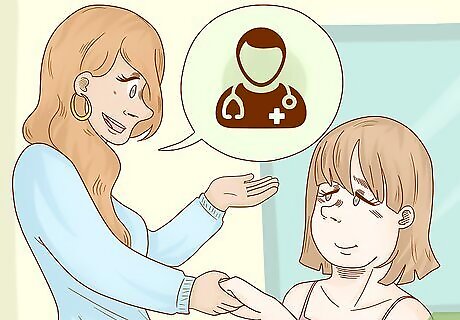
Suggest that your loved one talk to their doctor. Treating depression often requires the help of a medical professional. However, the idea of talking to someone can be intimidating. Your loved one may be more likely to follow through if you suggest that they talk to their primary care provider for a routine check-up. Then, if their doctor gives them a formal diagnosis of depression, it may make it easier for them to seek further help from a therapist or counselor. You might say something like, "Have you considered that an underlying medical issue could be causing you to feel this way? Maybe you should talk to your doctor about how you've been feeling lately." You could also say, "I've had a couple of friends who struggled with depression, and your symptoms sound a lot like that. Have you had a checkup lately?" Unfortunately, you can't force anyone to get help if they aren't ready, so if they say no, drop the subject for a while. However, if their symptoms worsen or don't improve, you may need to gently urge them again to talk to their physician.

Help them make a list of their symptoms or any questions they have. Before your loved one goes to their doctor, it's a good idea for them to write down some of the things they've been dealing with, like irritability, a loss of interest in their hobbies and friends, or trouble sleeping at night. Offer to help them write these things down, as well as any questions they want to ask their doctor about what they're going to or possible treatment options. That can help keep them on track at their appointment. Try saying something like, "Is there anything you're really worried about that you want to remember to ask the doctor? I could write that down for you." If they're open to talking about their depression, read them a list of symptoms and ask them to describe any of the ones they've dealt with. For instance, you might use the list at https://www.cdc.gov/reproductivehealth/depression/pdfs/PPDChecklist.pdf.
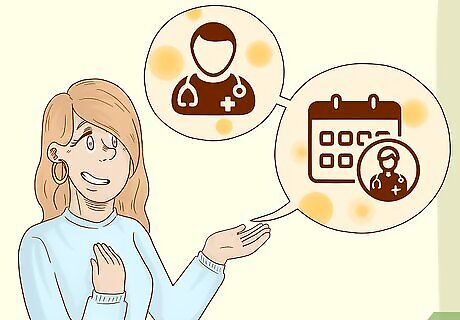
Offer to help them find a doctor and take them to the first appointment. Simple, day-to-day tasks can be overwhelming when you have depression. Taking on anything additional, like making calls to different doctors or handling insurance paperwork, can seem insurmountable. Let your loved one know you'll help them navigate the process, if they'd like, and offer to go with them to their first appointment. For instance, you might make a list of doctors in the area, then ask if they'd like for you to call a few. Try saying something like, "What can I do to make this easier for you? Would you like me to look up some doctors in the area?" or "Would it help if I called and set up the appointment?"

Don't expect treatment to fix the problem right away. Even if you can get your loved one to see a doctor, it's important to be realistic about your expectations. There is no overnight fix for depression. There may be underlying issues that need to be dealt with, or a chemical imbalance that needs to be treated. Your loved one may get discouraged if they don't see results from their treatment as quickly as they'd like, as well. However, let them know you're still going to be there for them, and encourage them to continue going to treatment.
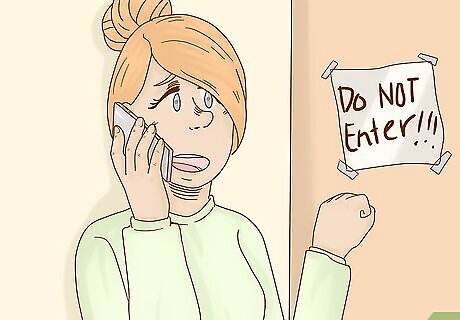
Call emergency services if your loved one threatens to hurt themselves. Unfortunately, depression can often go hand-in-hand with self-harm and suicidal thoughts or actions. If your loved one talks about hurting themselves, or if they suddenly start getting their affairs in order, become preoccupied with death, or start engaging in self-destructive behaviors, reach out to emergency services or a crisis center in your area. Not sure what number to call? In the US, dial 911 for emergency services or 1-800-273-8255 to reach the National Suicide Prevention Lifeline. In other countries, find a list of suicide prevention helplines by visiting https://www.iasp.info/resources/Crisis_Centres/. If it's possible, don't leave your loved one alone if you believe they're suicidal.
Setting Healthy Boundaries

Be honest if your loved one hurts you or lets you down. Don't allow your loved one to use their depression as an excuse to treat you badly. It's actually healthier for both of you if you speak up and let them know when they cross a line because it will keep resentment from building up between the two of you. When you talk to them, be kind, but also be firm and straightforward. For instance, if your loved one yells at you and calls you names while you're trying to help them, you might say something like, "I know that you're dealing with depression and that makes you want to push people away. I understand that, but it's still not okay for you to talk to me like that."

Make time for your own self-care. It can be physically and emotionally exhausting to care for someone else who's ill, especially if you're the primary caregiver. However, you can't encourage and support your loved one if you're burnt out, stressed, and exhausted, so set aside some time each day to attend to your own wants and needs. For instance, if you have a hobby you find relaxing, like doing crossword puzzles or meditating, try to make time for it as often as possible. You should also pay attention to your own nutrition and exercise needs. In addition to helping you feel better, you'll also be providing a better example for your loved one.

Keep in mind that you can't fix your loved one's depression. You're not to blame for your loved one's depression, and you can't cure it by yourself, no matter how much you love them. You can support them and encourage them, but recovery requires them to want it and work for it, and they may need medical intervention. Keeping this in mind can help you if you're struggling with feelings of responsibility or if you're getting overwhelmed because you're trying to care for them on your own.

Don't cover up your loved one's symptoms of depression. When you're talking to others, don't lie for your loved one, make excuses for their behavior, or try to hide the fact that they're depressed. Not only can this can cause you extra stress, but it can even make it harder for your loved one to seek help. If your loved one cancels on a family dinner at the last minute, for instance, resist the urge to say anything like, "Oh, something came up at work and Chris can't be here." Instead, try saying something like, "Yeah, Chris is having a tough time right now, and I think this was just a lot. Hopefully he'll be here next time."

Talk to a counselor if your own emotions start to overwhelm you. When you're caring for someone with depression or another illness, it's normal to struggle with feelings of fear, guilt, sadness, helplessness, or even anger. However, if those feelings become hard to deal with, reach out to a counselor who can help you learn to handle them in a healthy way. For example, the counselor may be able to recommend support services for loved ones with depression, or they may help you re-evaluate your boundaries to ensure your needs are being met.












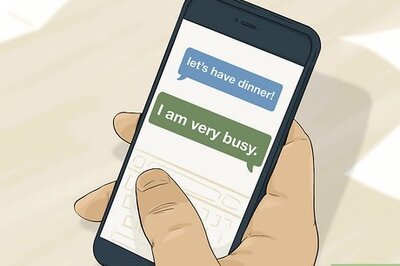






Comments
0 comment